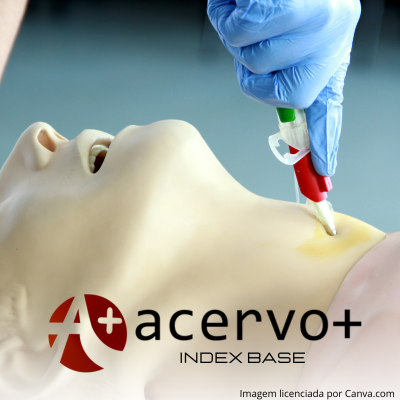A percepção do discente de medicina no ensino procedimental da cricotireoidostomia
##plugins.themes.bootstrap3.article.main##
Resumo
Objetivo: Mensurar a compreensão de graduandos de medicina sobre as práticas deliberadas de ciclo rápido, assim como suas percepções para um cenário clínico que exija um procedimento de alta gravidade como a cricotireoidostomia. Métodos: Estudo do tipo transversal com abordagem qualitativa. Construído e aplicado questionário fechado com 11 questões sobre a visão discente da estratégia utilizada e sobre a temática desenvolvida. Os dados foram cadastrados no programa Microsoft Excel e, posteriormente importados para o Software IBM-SPSS Statistics versão 28 - IBM Corporation, NY, USA; para análise exploratória dos dados. Resultados: 30 estudantes do curso de Medicina do quinto semestre ao décimo segundo semestre. Os resultados trouxeram absoluta aceitação desta estratégia e temática desenvolvida, considerando sob a perspectiva discente, superioridade desta técnica em relação a tradicional. Conclusão: Os resultados deste artigo corroboram para a hipótese de que práticas complexas e que podem gerar complicações graves, são mais fixadas pelos estudantes uma sensação maior de segurança quando ensinadas passo a passo, 83,83% relataram uma autopercepção de segurança para realização do procedimento e 100% consideram as PDCR superior que a simulação tradicional.
##plugins.themes.bootstrap3.article.details##
Copyright © | Todos os direitos reservados.
A revista detém os direitos autorais exclusivos de publicação deste artigo nos termos da lei 9610/98.
Reprodução parcial
É livre o uso de partes do texto, figuras e questionário do artigo, sendo obrigatória a citação dos autores e revista.
Reprodução total
É expressamente proibida, devendo ser autorizada pela revista.
Referências
2. AHO JM, et al. Every surgical resident should know how to perform a cricothyrotomy: An inexpensive cricothyrotomy task trainer for teaching and assessing surgical trainees. Journal of Surgical Education, 2015; 72(4):658-6.
3. BASTOS RA, et al. Solutions, enablers and barriers to online learning in clinical medical education during the first year of the Covid19 pandemic: A rapid review. Medical Teacher, 2022; 44(2): 187-95.
4. BAIR AE, et al. Cricothyrotomy: a 5-year experience at one institution. The Journal of Emergency Medicine, 2003; 24(2):151-6.
5. CASTRO LD e COUTO TB. Rapid Cycle Deliberate Practice: a modern simulation strategy. Scientia Medica, 2018; 28(1): ID28849.
6. CHANCEY R, et al. Learners' experiences during rapid cycle deliberate practice simulations: a qualitative analysis. Simulation in Healthcare, 2019; 14(1): 18-28.
7. CONOVER WJ. Practical nonparametric statistics. New York: John Wiley, 1999.
8. COOK DA, et al. Mastery learning for health professionals using technology- enhanced simulation: a systematic review and meta-analysis. Academic Medicine, 2013; 88(8): 1178-86.
9. COOK TM, et al. Major complications of airway management in the UK: results of the fourth National Audit Project of the Royal College of Anaesthetists and the Difficult Airway Society. Part 1: anaesthesia. Brithish Journal of Anaesthesia, 2011; 106(5): 617-31.
10. DIRX J e PRENGER S. A Guide to Planning & Implementing Instruction for Adults: A Theme-Based Approach. San Francisco: Jossey-Bass, 1997.
11. DRISKELL JE, et al. Effect of overlearning on retention. Journal of Applied Psychology, 1992;77(5):615-22.
12. FERNANDO N, et al. Undergraduate medical students’ perceptions and expectations of theatre-based learning: how can we improve the student learning experience? Surgeon, 2007; 5(5): 271-4.
13. HERZFELD D, et al. A memory of errors in sensorimotor learning. Science 2014;345(6202):1349-53.
14. HUNT E, et al. A novel approach to life support training using “action - linked phrases”. Resuscitation, 2015; 86(1):1-5.
15. HUNT E, et al. Integration of in-hospital cardiac arrest contextual curriculum into a basic life support course: a randomized, controlled simulation study. Resuscitation 2017;114(5):127-32.
16. HUNT E, et al. Pediatric resident resuscitation skills improve after “rapid cycle deliberate practice” training. Resuscitation, 2014; 85(7):945-51.
17. HUNT EA. Delays and errors in cardiopulmonary resuscitation and de brillation by pediatric residents during simulated cardiopulmonary arrests. Resuscitation, 2009; 80(7): 819-25.
18. ISSENBERG S, et al. Features and uses of high-fidelity medical simulations that lead to effective learning: a BEME systematic review. Medical Teacher, 2005; 27(1):10-28.
19. JAYE P, et al. "The Diamond": a structure for simulation debrief. The Clinical Teacher. 2015; 12(3): 171-5.
20. JOWETT N, et al. Surgical skill acquisition with self-directed practice using computer-based video training. American Journal of Surgery, 2007; 193(2): 237-42.
21. LEMKE DS, et al. Improved team performance during pediatric resuscitations after rapid cycle deliberate practice compared with traditional debriefing: a pilot study. Pediatric Emergency Care. 2019; 35(7): 480-6.
22. MCKENZIE I, et al. Motor skill learning requires active central myelination. Science 2014; 346(6207): 318-22.
23. MELCHIORS J, et al. Self-directed simulation-based training of emergency cricothyroidotomy: a route to lifesaving skills. European Archives of Oto-rhino-laryngology, 2016; 273(12): 4623-28.
24. MOCK CN, et al. Essential surgery: key messages from Disease Control Priorities. Lancet, 2015; 385(9983): 2209-19.
25. MOTTA EV e BARACAT EC. Treinamento de habilidades cirúrgicas para estudantes de medicina – papel da simulação. Revista De Medicina, 2018; 97(1), 18-23. https://doi.org/10.11606/issn.1679-9836.v97i1p18-23.
26. NARANJO MP, et al. Grau de satisfação do estudante de medicina no ensino baseado em simulação para a ginecologia e obstetrícia. Revista Eletrônica Acervo Saúde, 2023; 23(2): e11808.
27. PAZIN FILHO A e SCARPELINI S. Simulação: definição. Medicina (Ribeirão Preto), 2007; 40(2): 162-6.
28. PERRETTA JS, et al. Best Practices and Theoretical Foundations for Simulation Instruction Using Rapid-Cycle Deliberate Practice. Simulation Healthcare, 2020; 15(5): 356-62.
29. PINTO-COELHO L, et al. Prática deliberada em ciclos rápidos no treinamento de ressuscitação cardiopulmonar pediátrica: uma revisão de escopo. Latinoamerica de Simulación Clínica, 2022; 4(3): 85-93.
30. PUTNAM R e BORKO H. What do new views of knowledge and thinking have to say about research on teacher learning? Educational Researcher, 2000; 29(1):4-15.
31. ROSMAN SL, et al. Rapid cycle deliberate practice vs. traditional simulation in a resource-limited setting. BMC Medical Education, 2019; 19(1): 314.
32. SPENCER JÁ e JORDAN RK. Learner centred approaches in medical education. BMJ (Clinical Research Ed.), 1999; 318(7193):1280-3.
33. TARAS J e EVERETT T. Rapid cycle deliberate practice in medical education - a systematic review. Cureus, 2017; 9(4): e1180.

